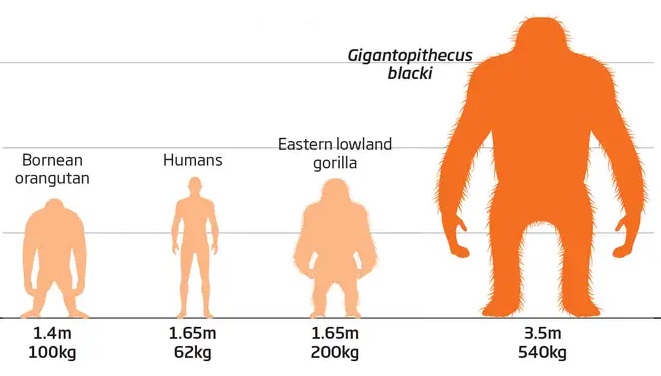Researchers learned why Earth’s largest ape went extinct more than 200,000 years ago
Gigantopithecus blacki are known to be the largest ever apes who lived on our planet. They died out between 295,000 and 215,000 years ago – 100,000 years earlier than previously thought, according to Chinese scientists, who by establishing a more accurate period of extinction also learned why they had vanished.
The updated knowledge which paleoanthropologist Yingqi Zhang of the Chinese Academy of Sciences in Beijing and his colleagues published in the 10 January issue of the journal Nature says the ancient 3-meter tall King Kongs had been pushed to extinction by the shifting environment.

After analysis of Gigantopithecus blacki fossils and sediments of about a dozen caves in southern China where the ape once thrived, they concluded that the apes were unable to adapt to the transformation of forests into savanna-like habitats.
Gigantopithecus blacki inhabited large swanks of forests and glasslands in southern China and until now scientists were in difficulty to answer when exactly and why those animals died out, given the fact that all the remnants consisted of a few thousands of teeth and four jawbones only.
The Chinese researchers used an array of different dating techniques to piece together what was the lifestyle of the closest cousins of modern orangutans, what they ate and how the environment looked like at that their time.
The team gathered data on the apes’ diet and behavior from their teeth, measuring isotopes of carbon and oxygen and looking for evidence of wear and tear. The team also collected fossil pollen and conducted luminescence dating on radioactive elements within the sediments.
More to read:
Why did our ancestors eat each other 1.45 million years ago?
They were surprised to learn that around 700,000 to 600,000 years ago, what is now southern China shifted from a forest landscape to a more seasonally-driven environment. Some apes, including orangutans, quickly adapted to these changes, but Gigantopithecus blacki failed to follow suit.
The new environment was scarcer in food and shelter, and provided fewer hunting opportunities for the carnivore giants.
Scientists then linked the deforestation event in the region about 3 centamillennials ago and the new findings about the ancient apes.
As a result, the number of Gigantopithecus blacki families dwindled dramatically and the species slowly vanished. Perhaps some families migrated into other, more friendly areas and pro-created for a while, but this did not save the species as a whole.
The new study clarifies an important aspect of a branch of apes and confirms that climate changes have always had a major role in the wildlife evolution.
More to read:
Human ancestors were almost extinct 900,000 years ago
***
Would you buy us a coffee? Do it via PalPal: office[at]rudeana.com. Thank you.







